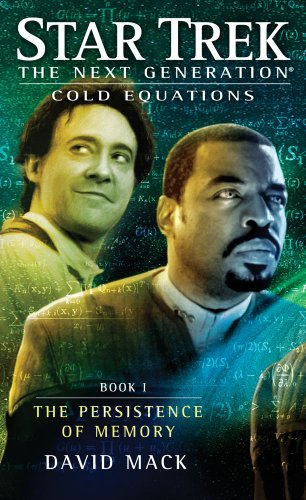Does an android have a soul?
This question was asked on February 13, 1989 when "The Measure of a Man" premiered on Fox, Channel 11 as watched my yours truly at the tender age of nine. The question is an easy enough one to answer when the robots are indistinguishable from humans, less so when they're more machine-like. If there is a God and he is good, I wouldn't imagine him to deny such a thing to intelligent machines just because they were made by his children than him. However, Star Trek is inherently agnostic because it reflects our world and the question of God is as up in the air today as it will undoubtedly be in the 24th century (and has been since time memorial).
The question of whether Data has a soul is actually a question of whether he has value as a person but, there's a hitch, machines can be repaired where humans can't. If you erase a computer program, you can reboot it if you have the data saved. If you were able to copy a person's memories and upload them to a new body, you would be able to have an exact replica of that person. It wouldn't be that person in literal terms, but it would be indistinguishable.
Or would it?
Lieutenant Commander Data was killed in Star Trek: Nemesis, sacrificing his life to destroy Shinzon's Thalaron super-weapon. His body was killed and, presumably, his soul went on to whatever afterlife (or lack thereof) which awaits us all. However, Data backed up his memories before he died. What are the ethics of using this Data to clone Data or reincarnate him in a new body?
In Star Trek Online: The Needs of the Many, B4 chose to voluntarily sacrifice his life to resurrect Data. In Star Trek Countdown, B4 was killed by accidentally uploading Data into his brain. In my tabletop RPG, I had Geordi upload Data into a holographic matrix. Plenty of Star Trek fans have thought of raising Data from the dead using his backups without really questioning whether this is Data or if it reflected his wishes.
To help you understand the ethics if they're elusive to you, how would you feel if (after your death) your friends or family commissioned someone to create an exact copy of you.
The Persistence of Memory examines the question in a surprisingly easy and light manner. An android duplicate of Doctor Noonien Soong, creator of Data and other androids, intends to recreate his deceased son. Doctor Noonien Soong is a figure who believes, perhaps erroneously, he's a transfer of his consciousness rather than just a mental clone in a android's body. For him, the question of whether or not Data is dead is largely irrelevant. For others, they don't want to examine the question, merely have their lost friend back.
Much of the book deals with the life, history, and doings of Doctor Soong. The books take on him is somewhat darker than I expected. I've always viewed Doctor Soong as a harmless eccentric, more Doc Brown than Sivana, possessed of overwhelming arrogance as well as callous disregard for other people's feelings. An example of his almost Howard Hughes-like antics includes building an entirely automated casino on Orion.
Doctor Soong's misanthropy never approaches the level where he's a villain but David Mack illustrates Doctor Soong's flaws run deep as well as wide. Watching his newly immortal android self waste his life accumulating wealth and influence in order to rival an equally immortal associate (TOS Episode "Requiem for Methuselah" character Flint) is sad, especially when we discover someone Doctor Soong cares about more than anyone has gone over to join his side.
The book lacks a confrontation between these figures and I feel kind of bad about this. I really wanted Doctor Soong to show why he was a better inventor than his rival, a better husband, and a better father. Unfortunately, the book prefers to leave Flint in his position as unchallenged master of robotics, which saddens me. Of course, given the book's ending, a form of this confrontation may yet take place.
While the book primarily deals with the immortal Soong android's doings as well as his plot to restore Data, the crew of the Enterprise-E plays a central role. Sadly, this book kills one of my favorite novel-only characters in a manner I felt diminished her character. I'm aware authors have more freedom to kill non-television characters but that doesn't mean it should be done. It seemed a terrible waste to destroy such a promising character to illustrate our heroes' danger.
I won't spoil whether or not Doctor Soong succeeds in his quest to resurrect Data. There's been a lot of controversy over whether or not the book would do it. Personally, I think that ship has sailed. Not only was Spock returned from the dead and many excellent stories done with him thereafter but there have been quite a personal character studies done about death (VOY's "Mortal Coil", "Barge of the Dead", and "Coda" for example). A good story is a good story whether or not it involves resurrection. A hack story is a hack story whether it returns a well-loved character or not.
This is not a hack story.
8/10

No comments:
Post a Comment
Note: Only a member of this blog may post a comment.